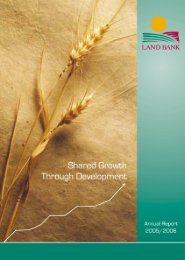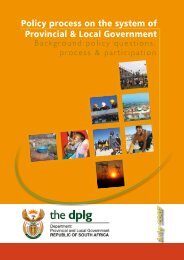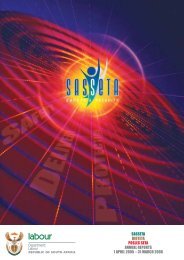Academy of Science South Africa 2005/6 Annual Report
Academy of Science South Africa 2005/6 Annual Report
Academy of Science South Africa 2005/6 Annual Report
- No tags were found...
Create successful ePaper yourself
Turn your PDF publications into a flip-book with our unique Google optimized e-Paper software.
ASSAfProgramme 4development, science and mathematics education, and the relationship between science and religion. He is alsoa man who has contributed in significant ways, through enduring public service, towards improving the quality<strong>of</strong> life <strong>of</strong> the most marginalised <strong>of</strong> our fellow citizens, and through various means towards the success <strong>of</strong> our newdemocracy.George Ellis is a world leader in the areas <strong>of</strong> general relativity and cosmology, the study <strong>of</strong> the large-scalestructure <strong>of</strong> the universe. His seminal contributions to this field <strong>of</strong> endeavour are truly too many to list but includethe development <strong>of</strong> the singularity theorems with Roger Penrose and Stephen Hawking, the monograph ‘The LargeScale Structure <strong>of</strong> Spacetime’, written with Hawking, and his fundamental work on observations in cosmologicalmodels, in which he addresses the relationship between theoretical cosmology and cosmological observations.In recent years he has written extensively on the topics <strong>of</strong> emergent universes and ‘multiverses’. George Ellis’scontributions as a cosmologist would suffice to secure for him a place among the scholarly giants in this country,and indeed globally. But to confine attention only to these achievements would be to present a wholly incompletepicture <strong>of</strong> the person. For George Ellis is truly a Renaissance Man whose activities, interests and achievementsextend across an almost improbably broad range <strong>of</strong> the sciences and social sciences, and include public and socialservice.Pr<strong>of</strong>essor Ellis has written and spoken extensively on topics pertaining to the relationship between science andreligion. In 2004 he was awarded the 2004 Templeton Prize, the largest monetary award made to an individual, forhis contributions towards achieving a better understanding <strong>of</strong> the relationship between science and spirituality. Inhis work George Ellis has advocated a balance between the rationality <strong>of</strong> evidence-based science on the one hand,and phenomena that lie beyond the ability <strong>of</strong> science to explain: examples would be aesthetics, ethics, metaphysics,meaning, morality, faith and hope, all <strong>of</strong> which are ‘causally effective’. His key ideas are most effectively capturedin his book with Nancey Murphy ‘On the moral nature <strong>of</strong> the universe: Cosmology, theology, and ethics’. In recentyears he has turned his considerable intellect loose on problems that represent arguably the greatest challenge toscholarship in the 21st century, viz. a complete understanding <strong>of</strong> the workings <strong>of</strong> the brain, and the relationshipto human behaviour, the intellect, and emotions. In recent work George Ellis and Judith Toronchuk show how64 Promoting Excellence in <strong>Science</strong> for Society


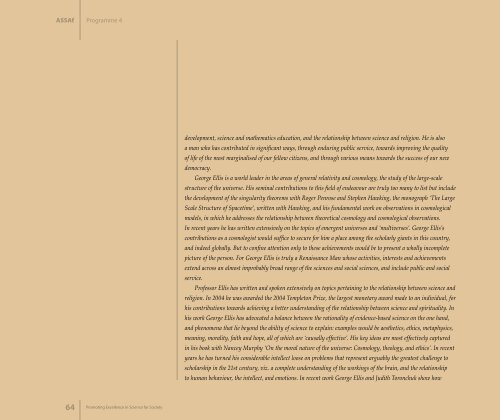
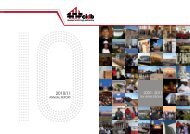
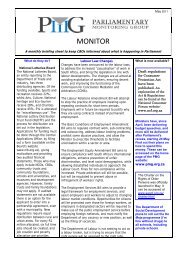
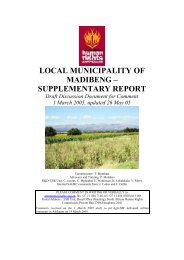
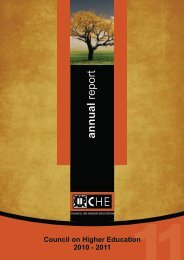
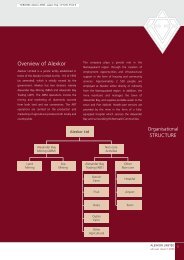
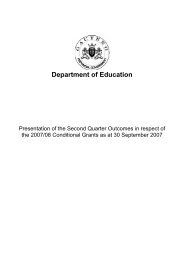
![National Research Foundation Annual Report 2008 / 2009 [Part 2]](https://img.yumpu.com/49774036/1/177x260/national-research-foundation-annual-report-2008-2009-part-2.jpg?quality=85)

